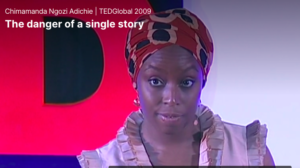Oxford Dictionary defines a stereotype as “a widely held but fixed and oversimplified image or idea of a particular type of person or thing.” Many Christians have a stereotypical view of Muslims, just like many Muslims have a stereotypical view of Christians. Three of the most common features of the Christian stereotype of Muslims are that they
- Promote/support violence or terrorism
- Abuse women and girls
- Want to impose sharia law on the West
In fact, some Muslims do promote violence and abuse women. But the same can be said of some Christians. (Many Christians would counter that any Christian who promotes violence and abuse isn’t really Christian. And many Muslims say the same thing about violent and abusive Muslims: they’re not true Muslims at all.) Likewise, some Muslims—but certainly not all Muslims—would love to see the sharia enacted as law in the West.
There’s no denying that many Americans and Canadians—many of them Christian—hold this stereotype of Muslims. In America alone there’s been an exponential increase in hate crimes against Muslims, Arabs and people thought to be Muslim or Arab since 9/11. A shocking 1700% increase, in fact. And this stereotype fuels the prejudice and racism behind these crimes.
 In her TED Talk on the power of story, Nigerian novelist Chimamanda Adichie, explains how easily we turn a single narrative about another people into the only narrative about them. To make it the one thing we need to know about them. She says many Westerners do this with Africans, as if poverty, AIDS and fighting senseless wars were the whole truth about them. Adichie argues that “to insist on only these negative stories is to flatten my experience and to overlook the many other stories that formed me.” She continues,
In her TED Talk on the power of story, Nigerian novelist Chimamanda Adichie, explains how easily we turn a single narrative about another people into the only narrative about them. To make it the one thing we need to know about them. She says many Westerners do this with Africans, as if poverty, AIDS and fighting senseless wars were the whole truth about them. Adichie argues that “to insist on only these negative stories is to flatten my experience and to overlook the many other stories that formed me.” She continues,
“The single story creates stereotypes, and the problem with stereotypes is not that they are untrue, but that they are incomplete.” They make a single story the whole story.
The same is true of religious stereotypes. And the knee-jerk response to any stereotype is to replace its single story with another. Karen Armstrong does this in relation to the Muslim stereotype. She denies the Christian distortion by insisting on its opposite: Islam equals peace, etc. But this monotony of exaggerated claim and counterclaim is false. Instead of replacing one single story with another, we need “a balance of stories,” as Chinua Achebe, another Nigerian writer, says. Whichever story we choose, it’s the classic case of the blind men and the elephant, with each limiting the elephant to just one aspect, for example, its snake-like trunk.
Many Muslims hold stereotypical views of Christians—that they all embrace Hollywood’s morality and love to start wars, for example. Some Christians undeniably do. But most of the ones I know find Hollywood’s morals—or lack thereof—and Western warmongering appalling. By the same token, making the violence and aggression of some Muslims the only truth about all Muslims turns it into a lie. Still, what makes the stereotype work is the fact that it is true of some Muslims, a fact Armstrong seems oblivious to. So, while I appreciate her motivation and laud her for her zeal, she needs a more nuanced view of Muslims and Islam.
Likewise, we need to remind those who stress Islam’s negatives of its positives. We must tell those who say “the Qur’an advocates violence” that there’s more than one interpretation of the Qur’an. We must tell those who say the sharia promotes the abuse of women and the world’s Islamization about the many Muslims who don’t accept the sharia uncritically.
Questions about whether Islam’s source documents promote violence, the oppression of women or Islam’s political expansion are very valid. In fact, they’re vital. But that’s an entirely different matter. The fact remains that it’s unfair to paint all Muslims with one brush, just as it’s unfair to do the same to Christians.
As Adichie says, embracing stereotypes “robs people of dignity. It makes our recognition of our equal humanity difficult.” Ignoring similarities, we stress only how different we are.[1]
Fear leads Christians to embrace the Muslim stereotype, just as fear leads others to hide behind its opposite. But we can’t let fear control us, putting Muslims outside the scope of Jesus’ Golden Rule. We must treat our Muslim neighbors, too, with the truth and grace we want them to show us in return. Beyond being the right thing to do, this is
- wisdom’s way
- how we express our love for God
- how we show our Muslim neighbors the essence of our faith
Jesus’ underscores its importance in his description of the final judgment, when he says in essence, “Whatever you did to them, you did to me.”[2] If we truly want to be his disciples, we must love our Muslim neighbor as ourselves, stereotypes be damned.
——————————–
[1] https://www.ted.com/talks/chimamanda_ngozi_adichie_the_danger_of_a_single_story?referrer=playlist-elif_shafak_7_truly_captivati&language=en#t-792780 Accessed November 28, 2019.
[2] Matt. 25:40, loosely paraphrased.




Leave a Reply